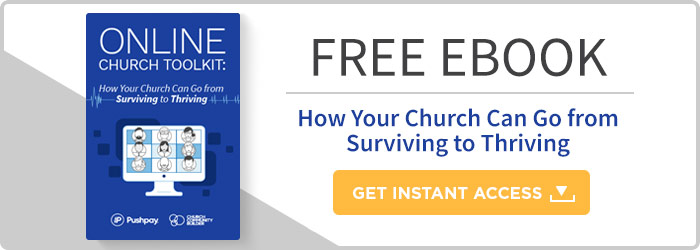
6 Tips for Bringing Your Children’s Ministry Online
A problem most churches haven’t had to navigate until now is how to bring children’s ministry online. Here are six tips that will help.
Right now many churches across the country are scrambling to take their services online and digitally replicate their in-person ministries. For churches that have embraced tech all along, this has been different (you don’t normally livestream your service from an empty room), but it’s been much less of a challenge.
But a problem most churches haven’t had to navigate until now is how to bring children’s ministry online.
One of the major goals of strong kidmin programs is often to position parents as the primary spiritual influencer in a child’s life. As families practice social distancing and churches hold online-only services, churches will need to prioritize that goal now more than ever. Your parents want support and guidance to raise their kids to know and follow Christ.
Here are six tips for bringing your children’s ministry online:
1. Share your curriculum in multiple places
You already put a lot of thought and effort into providing your students with age-appropriate curricula. Just because you can’t be with them in person doesn’t mean this has to stop (especially if it comes from a third party). But the key is making it accessible to parents.
It’s easy to assume that if you’ve made something available somewhere on the web, people will find it. But if you make church members jump from your Facebook page to your website to your app to find all your songs, activities, memory verses, and lessons, a lot of them are going to give up before they figure out where you’ve stashed the goods.
Make sure all of your curricula is discoverable through every major online hub your church has (social, website, app), and make sure you communicate this through your main channels (email, social, push notifications, etc.).
2. Create special instructions for parents
Obviously you don’t just want to throw the materials into your app or onto your website and leave parents to fend for themselves. Many parents don’t feel equipped or knowledgeable enough to teach their children about God or the Bible. Right now your church should focus on helping parents feel more confident and capable.
Send your parents an email or letter explaining how online-only church will impact what kidmin looks like, and walk them through how to teach their child about God. Remember, unless they volunteer in your classrooms, parents haven’t received the training or instruction your volunteers have had. So start with the basics, and be sure that all the materials you give parents come with plenty of guidance.
You may even want to include contact information for your children’s ministry team so that parents can reach out for support. You could also have your kidmin leaders host a video conference or livestream for parents to address concerns, provide tips, and walk them through the curriculum.
3. Record or stream lessons
Even as you set parents up to lead their kids well, you can’t ignore the fact that your students have been building relationships with the teachers who volunteer in your classrooms. If it’s possible, you should coordinate with your volunteers to find times for them to record or stream lessons, either from your kidmin classrooms or from home. This ensures that kids still have opportunities to see their faces and hear their voices. It also helps model good teaching for parents.
4. Ask families what they want and need
When it comes down to it, the parents in your congregation are going to be the best sources for learning how you can support their families right now. They might just want to know what resources you recommend. Or they may want more support as they try to develop their own age-appropriate lessons. Or maybe they want their kids to join them for the livestream, and they have challenges they’d like you to help them navigate.
5. Schedule a separate online kidmin time
With in-person gatherings, children’s ministry always happens at the same time as your adult service. That’s not going to work anymore. There are no volunteers to teach and lead kids. And even older kids will have trouble focusing if they’re just planted in front of a screen to watch someone teach. Parents—especially those with young children—won’t be able to participate in your service while trying to manage kidmin.
Turn kidmin into family time, and if you’re having some kind of live event, schedule it for a separate time from your regular service.
6. Invest in a media platform
Parents are really struggling to find ways to keep kids busy without feeling like horrible parents. For years parents have been cautioned against letting kids have too much screen time. That’s all out the window now. And by investing in a media platform like RightNow Media, your church can point parents to positive, age-appropriate, and edifying shows and movies that will keep their kids busy while they navigate working remotely or just try to get a break from hands-on activities.
Support your families
As churches struggle to increase digital touchpoints with their congregations, it’s important to recognize that kidmin is likely the area where this will be most difficult. But this is the perfect opportunity for churches to equip and encourage parents to make home a place where their kids are nourished in their relationship with God.







